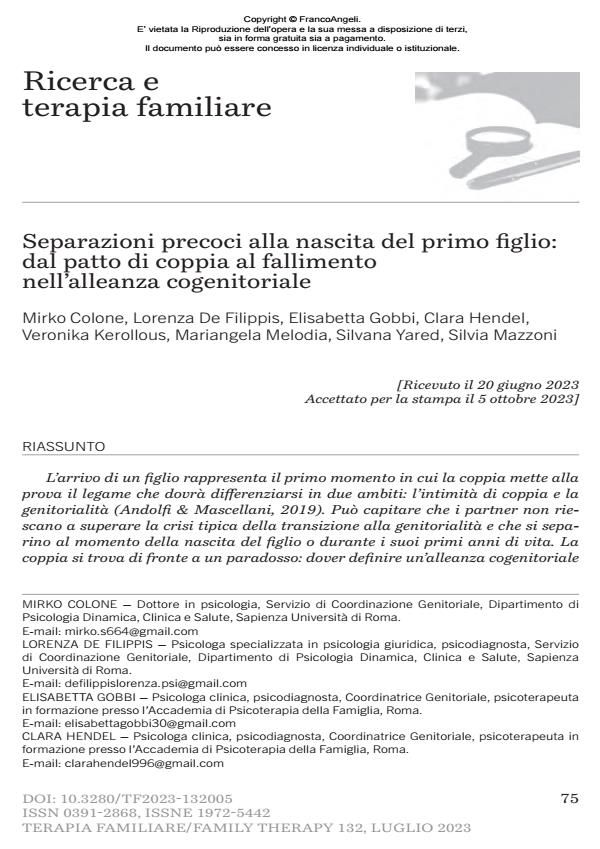Early separations at the birth of the first child: from the couple’s pact to the failure of the co-parenting alliance
Journal title TERAPIA FAMILIARE
Author/s Mirko Colone, Lorenza De Filippis, Elisabetta Gobbi, Clara Hendel, Veronika Kerollous, Mariangela Melodia, Silvana Yared, Silvia Mazzoni
Publishing Year 2023 Issue 2023/132
Language Italian Pages 19 P. 75-93 File size 663 KB
DOI 10.3280/TF2023-132005
DOI is like a bar code for intellectual property: to have more infomation
click here
Below, you can see the article first page
If you want to buy this article in PDF format, you can do it, following the instructions to buy download credits

FrancoAngeli is member of Publishers International Linking Association, Inc (PILA), a not-for-profit association which run the CrossRef service enabling links to and from online scholarly content.
The arrival of a child represents the first moment in which the couple tests the strength of the bond which will have to differentiate in two areas: the intimacy of the couple and the coparental alliance (Andolfi & Mascellani, 2019). It may happen that the partners are unable to overcome the crisis typical of the transition to parenthood and that they separate at the time of the child’s birth or during its first years of life. The couple is faced with a paradox: having to define a coparental alliance and a sense of family integrity precisely during the separation. Since several studies have shown that parental separation within the first three years of life represents an important risk factor for the development of children (Belsky, Putnam & Crnic, 1996; Frosh, Mangelsdorf & McHale, 2000; McHale, Johnson & Sinclair, 1999), this article has two objectives: to describe the guidelines for the clinical evaluation of the couple’s failure after the birth of the child; present an analysis of the characteristics of 11 families whose parents were assessed by a Custody Evaluator (CTU) applying the proposed guidelines. The characteristics of the psychological or psychotherapeutic support intervention will also be defined, following a trigenerational and multifocal perspective, involving all the people who are part of the child’s coparenting system.
Keywords: couple’s pact, co-parenting alliance, early separation, personal authority, conflict, children.
Mirko Colone, Lorenza De Filippis, Elisabetta Gobbi, Clara Hendel, Veronika Kerollous, Mariangela Melodia, Silvana Yared, Silvia Mazzoni, Separazioni precoci alla nascita del primo figlio: dal patto di coppia al fallimento nell’alleanza cogenitoriale in "TERAPIA FAMILIARE" 132/2023, pp 75-93, DOI: 10.3280/TF2023-132005